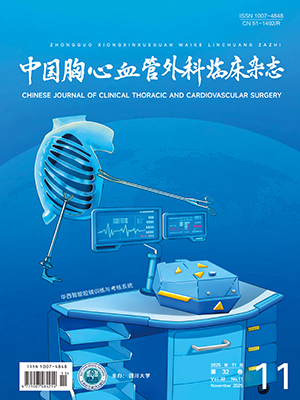| 1. |
Doenst T, Wijeysundera D, Karkouti K, et al. Hyperglycemia during cardiopulmonary bypass is an independent risk factor for mortality in patients undergoing cardiac surgery. J Thorac Cardiovasc Surg, 2005, 130(4): 1144.
|
| 2. |
Alserius T, Anderson RE, Hammar N, et al. Elevated glycosylated haemoglobin (HbA1c) is a risk marker in coronary artery bypass surgery. Scand Cardiovasc J, 2008, 42(6): 392-398.
|
| 3. |
Schmeltz LR, DeSantis AJ, Thiyagarajan V, et al. Reduction of surgical mortality and morbidity in diabetic patients undergoing cardiac surgery with a combined intravenous and subcutaneous insulin glucose management strategy. Diabetes Care, 2007, 30(4): 823-828.
|
| 4. |
McAlister FA, Man J, Bistritz L, et al. Diabetes and coronary artery bypass surgery: an examination of perioperative glycemic control and outcomes. Diabetes Care, 2003, 26(5): 1518-1524.
|
| 5. |
Galindo RJ, Fayfman M, Umpierrez GE. Perioperative management of hyperglycemia and diabetes in cardiac surgery patients. Endocrinol Metab Clin North Am, 2018, 47(1): 203-222.
|
| 6. |
Buehler L, Fayfman M, Alexopoulos AS, et al. The impact of hyperglycemia and obesity on hospitalization costs and clinical outcome in general surgery patients. J Diabetes Complications, 2015, 29(8): 1177-1182.
|
| 7. |
Székely A, Levin J, Miao Y, et al. Impact of hyperglycemia on perioperative mortality after coronary artery bypass graft surgery. J Thorac Cardiovasc Surg, 2011, 142(2): 430-437.
|
| 8. |
Frisch A, Chandra P, Smiley D, et al. Prevalence and clinical outcome of hyperglycemia in the perioperative period in noncardiac surgery. Diabetes Care, 2010, 33(8): 1783-1788.
|
| 9. |
American Diabetes Association. 2. Classification and diagnosis of diabetes: standards of medical care in diabetes—2018. Diabetes Care, 2018, 41(Suppl 1): S13-S27.
|
| 10. |
中华医学会糖尿病学分会. 中国2型糖尿病防治指南(2017年版). 中华糖尿病杂志, 2018, 10(1): 4.
|
| 11. |
McGinn JT Jr, Shariff MA, Bhat TM, et al. Prevalence of dysglycemia among coronary artery bypass surgery patients with no previous diabetic history. J Cardiothorac Surg, 2011, 6: 104.
|
| 12. |
Duncan AE, Abd-Elsayed A, Maheshwari A, et al. Role of intraoperative and postoperative blood glucose concentrations in predicting outcomes after cardiac surgery. Anesthesiology, 2010, 112(4): 860-871.
|
| 13. |
Lazar HL, Chipkin SR, Fitzgerald CA, et al. Tight glycemic control in diabetic coronary artery bypass graft patients improves perioperative outcomes and decreases recurrent ischemic events. Circulation, 2004, 109(12): 1497-1502.
|
| 14. |
Jung HS. Clinical implications of glucose variability: chronic complications of diabetes. Endocrinol Metab (Seoul), 2015, 30(2): 167-174.
|
| 15. |
Gatti G, Perrotti A, Reichart D, et al. Glycated hemoglobin and risk of sternal wound infection after isolated coronary surgery. Circ J, 2016, 81(1): 36-43.
|
| 16. |
Verdoia M, Schaffer A, Barbieri L, et al. Glycosylated hemoglobin and the risk of periprocedural myocardial infarction in non-diabetic patients. J Diabetes Complications, 2015, 29(4): 517-522.
|
| 17. |
Halkos ME, Puskas JD, Lattouf OM, et al. Elevated preoperative hemoglobin A1c level is predictive of adverse events after coronary artery bypass surgery. J Thorac Cardiovasc Surg, 2008, 136(3): 631-640.
|
| 18. |
Gumus F, Polat A, Sinikoglu SN, et al. Use of a lower cut-off value for HbA1c to predict postoperative renal complication risk in patients undergoing coronary artery bypass grafting. J Cardiothorac Vasc Anesth, 2013, 27(6): 1167-1173.
|
| 19. |
Subramaniam B, Lerner A, Novack V, et al. Increased glycemic variability in patients with elevated preoperative HbA1C predicts adverse outcomes following coronary artery bypass grafting surgery. Anesth Analg, 2014, 118(2): 277-287.
|
| 20. |
Egi M, Bellomo R, Stachowski E, et al. Variability of blood glucose concentration and short-term mortality in critically ill patients. Anesthesiology, 2006, 105(2): 244-252.
|
| 21. |
Bardia A, Khabbaz K, Mueller A, et al. The association between preoperative hemoglobin A1C and postoperative glycemic variability on 30-day major adverse outcomes following isolated cardiac valvular surgery. Anesth Analg, 2017, 124(1): 16-22.
|
| 22. |
王锦, 吴海鹰, 张红仙, 等. 血糖变异性对脓毒症28d死亡率临床影响. 昆明医科大学学报, 2014, 35(1): 98-101.
|
| 23. |
Lee SH, Han K, Cho H, et al. Variability in metabolic parameters and risk of dementia: a nationwide population-based study. Alzheimers Res Ther, 2018, 10(1): 110.
|
| 24. |
Ceriello A, Esposito K, Piconi L, et al. Oscillating glucose is more deleterious to endothelial function and oxidative stress than mean glucose in normal and type 2 diabetic patients. Diabetes, 2008, 57(5): 1349-1354.
|
| 25. |
Casqueiro J, Casqueiro J, Alves C. Infections in patients with diabetes mellitus: A review of pathogenesis. Indian J Endocrinol Metab, 2012, 16 Suppl 1: S27-S36.
|
| 26. |
Koh GC, Peacock SJ, van der Poll T, et al. The impact of diabetes on the pathogenesis of sepsis. Eur J Clin Microbiol Infect Dis, 2012, 31(4): 379-388.
|




